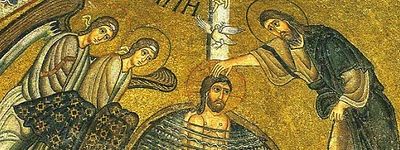In the name of the Father, and of the Son, and of the Holy Spirit!
Dear fathers, brothers and sisters! Today is a special service called The Eve of Theophany. This service is very similar to the one we celebrated on Christmas Eve—it begins with the Royal Hours and continues with the Vespers and the Liturgy of St. Basil the Great. Why is this? Because until the fifth century A.D., the  The Nativity of Our Lord and Savior Jesus Christ
The Nativity of Our Lord and Savior Jesus Christ
“>Nativity of Christ and  Theophany “>Theophany were solemnly celebrated on the same day. After the fifth century, these two feasts were separated. But both Christmas Eve and the Eve of Theophany have been preserved.
Theophany “>Theophany were solemnly celebrated on the same day. After the fifth century, these two feasts were separated. But both Christmas Eve and the Eve of Theophany have been preserved.
The Greek name for this service, “Paramoni”, means “the threshold of the feast”, and this day is called Sochelnik in Russian because, according to the tradition of the Church, a special dish of boiled rice and honey, called sochivo, is prepared on this day.
The Feast of Theophany, the Baptism of the Lord, is special for each one of us. At the service the amazing extract from the Gospel of Luke is read, in which the Lord calls on St. John the Baptist to preach repentance. Having gone to the banks of the Jordan, John the Baptist raises his voice; he is like an angel crying in the wilderness, preparing the way of the people to the Lord (cf. Lk. 3:3–18). Different people came to him when he preached; these were Pharisees, Sadducees, publicans, soldiers, and ordinary people. His words about repentance were addressed to all of them.
What is repentance? We’ve talked about this many times.  Cleansing the Heart and Mind Through RepentanceThe most perfect and greatest thing a man can desire and achieve is drawing near to God and abiding in solitude with Him.
Cleansing the Heart and Mind Through RepentanceThe most perfect and greatest thing a man can desire and achieve is drawing near to God and abiding in solitude with Him.
“>Repentance is not only an awareness of the sinfulness of the actions that are not consistent with the life of a person who believes in the Lord, but also a desire to improve fully and never again commit acts that violate the will of God and are called sins, or iniquities.
The Sadducees and the Pharisees who were present during St. John the Baptist’s preaching were confident that they knew the Holy Scriptures much better than the others did and would definitely inherit the Kingdom of God. But when people asked, “What should we do?”, John the Baptist first of all spoke about almsgiving: “If you have two items of clothing, give the extra one to someone in need, or at least lend it to him to keep him warm.”
When the publicans wondered: “What should we do to repent?” St. John the Baptist did not call on them to abandon their service, their duty before the state to collect taxes, but told them not to take too much. The publicans were called to the service of the Roman Empire, which ruled over what was then Palestine, the people of Israel; and unfortunately, they often abused their authority and levied more money and taxes than the Government demanded of them. Everyone knew this, and therefore the publicans were detested by the people from whom they actually came—they were fellow tribesmen of the Israelites.

When the soldiers asked St. John the Baptist for advice: “What should we do?”, he replied: “Do not offend anyone, do not slander and be content with your wages.”
These words may seem strange to some of you. What does it mean, “do not offend”? After all, soldiers are called to defend and even kill in war. They are warriors. But this call was addressed to the civilian population and not during war when every soldier is supposed to defend his country even to the point of death. And he must understand who he is taking up arms against and who he is going against.
What did he mean by “do not slander?” A soldier has special authority, and for personal advantage, such as obtaining a special position and furthering his career, he could slander a civilian, or someone with whom he served. St. John the Baptist put special emphasis on this problem, which was widespread among military personnel and not only them—they slandered for the sake of their prosperity and career opportunities.
John the Baptist’s third counsel to the soldiers was to be content with the wages they were paid. For those who are not content with what they have will neglect everything in order to achieve greater prosperity—they will kill, steal and slander. Nothing will be sacred to them, neither family, nor friends. From now on, they have only one god—their personal prosperithy, and they are just mercenaries. In order not to be such mercenaries we must always be satisfied with the positions and the blessings that we have now and that the Lord is bestowing on each one of us at the moment. It does not mean that we should not develop, it does not mean that we should not have more and more achievements. But all this must be in accordance with the will of God, His mercy, His love, and agree with the commandments of the Holy Scriptures.
To those who will not heed the call of St. John the Baptist he utters dreadful words: The axe is already at the root of the trees, and the tree that does not bear good fruit will be cut down and thrown into the fire.

We all understand the edifying words of John the Baptist. If we do not bear good fruits, if our faith is without works and dead, then our tree—that is, ourselves—will be cast into hell, and there we will have no hope of salvation. Therefore, we must hurry to do good deeds in addition to the faith that is directed towards the Lord in our hearts: charitable acts and works of love for others.
Today after the service the water is blessed with a special rite. Such water is called the great agiasma—that is, Theophany water. Today and tomorrow (January 19), the water is blessed by the same rite, so it has the same power and the same grace of God. Every Christian believer should keep this water at home throughout the year. Traditionally, we consume this water on an empty stomach after prayer, with a piece of prosphora. Our Theophany water is kept in a special place of honor, where other holy objects are kept—closer to the holy corner, closer to our home “iconostasis”.
If a person is sick or attacked by unclean spirits, then Theophany water can be consumed at any time and not even on an empty stomach.
Following the tradition, today and tomorrow we sprinkle our homes with this water, sprinkle the area on which our houses stand, and sprinkle ourselves with this holy water, which bears a special grace and healing properties. According to our faith be it unto us (cf. Mt. 9:29). Let us consume this holy water with all faith and reverence and thank God that we have it.
Holy water has other special properties as well: If we are about to run out of it, we can add ordinary water to it, because we know that holy water sanctifies the latter, which acquires the same power of grace as Theophany water. There is no need to take huge containers of holy water, carry them from church, overstrain yourself and get sick. Take a little, and at home mix it with plain water—and you will have plenty of holy Theophany water.

Dear brothers and sisters, let us hear St. John the Baptist’s call for repentance today, let us mend our ways, make our paths to the Lord straight, and come to the Lord without any shadow of sin, trusting in His mercy and love for us. Amen.







